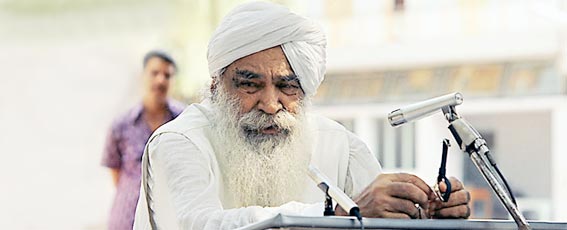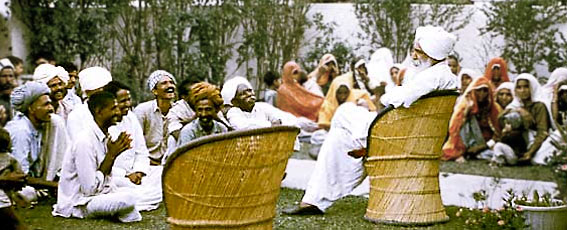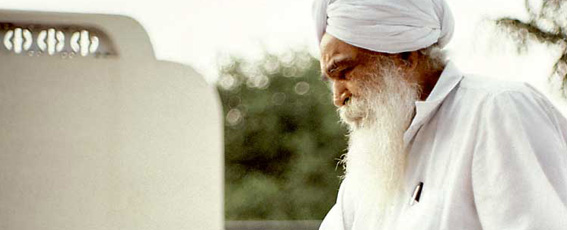Question: To what extent is outer behaviour indicative of inner spiritual growth?
Sant Kirpal Singh: A keen sense of self-abnegation and self-naughting is the outward expression of one’s spiritual progress. It is not exhibited to hide our weaknesses but to actually make one feel in the heart of hearts that one is nothing but a mere tiny cog in the vast machinery of divine purposes. One who becomes a conscious co-worker of the divine plan, never assert but humbly describes in third person. He never despises any one but always relishes to offer loving help and assistance to others. He does not criticize, but narrates the facts of life in a selfless manner for our spiritual benefit.
He lives sincerely up to the holy commandments, irrespective of the results. He does not yield to the environments but adjusts himself knowing fully well that he is always under the gracious protection of the Master Power. He is never gloomy and in his heart of hearts is always cheerful, even in the face of misfortunes. He does not blame others for their shortcomings but seeks to weed them out by careful living and adaptation. He does not attribute his spiritual progress to his own single-handed earnest endeavours but considers it as a holy gift from the Master. He is well-balanced in failure and success. He can forgive and forget easily. He is seldom provocative and is rather blessed with a keen sense of loving co-operation for the spiritual welfare of others.
He does not assert his authority nor claims any superiority over the less developed souls, but behaves like a friend or brother and inwardly prays for their redemption. He never feels burdened with the worries of others and can offer sublime solutions with much ease. He is ever compassionate in his heart and wishes the welfare of all men, animals, birds or insects. He is always full of deep gratitude, and seldom complains about his difficulties whatsoever. He is chaste and kind but hides his virtues under the cloak of studied science. He never boasts of his valour or intelligence but seeks to help others surreptitiously. He dislikes lime-light. He shuns publicity and feels shy in large crowds. He does not like acting and posing, but is always unassuming and natural in his behaviour.
He can silence his thoughts at will by attuning with the holy Naam within and by turning his attention to the holy feet of the Master. He is ever protected by Him and is hourly fed – nay rather every moments is blessed with the loving life impulses from the Master Power. He knows it fully well that this physical life is but a passing phase of the soul from the lower categories of creation in the long drama of human existence, and nothing material will accompany into the beyond. He does not believe in hoarding but tries to live a frugal life full of contentment. He is not allured by the spell of higher living but considers it as a strong fetter on the human soul. He does not vie with the so-called affluent and rich people but inwardly prays for their spiritual liberation from the wheel of birth and death. He does not live for eating but eats for living a life full of divine bliss and harmony. He is not fond of gaudy dresses but is satisfied with the simple garments procured at reasonable prices.
He does not shirk hard work but undertakes mighty jobs for the good of others at the cost of his physical endurance in a selfless manner. He does not demand reward for his labours but considers the sacred dedication as a boon in itself. He will seek to help others even at the cost of his own suffering. He is, in a nutshell, a righteous man of good thoughts, good words and good deeds.
Question: Is a disciplined initiate one who attends Satsangs regularly, adheres to the vegetarian diet and devotes time to practices with due regard to self-introspection?
Sant Kirpal Singh: Yes, these are the cardinal virtues of a disciplined initiate which should be inculcated and assimilated in a state of loving humility.
Question: Do we, as Satsangis, have a special aim or responsibility?
Sant Kirpal Singh: Well, as initiates, we have taken on a duty. And with duty there is a definite responsibility.
A member of the Ruhani Satsang takes upon himself the most important and the most difficult task in the world i.e. enabling himself and his fellow beings to attain self-knowledge and God-knowledge. Thus our aim is knowledge of the beyond.
Science of the soul seeks to make the human soul one with God by transcending the physical, the astral and the causal planes of existence. It is therefore quite independent. Outer forms and ceremonies, rites, rituals, sacrifices, fasts, vigils or pilgrimages, these are outer practices called apara vidya. In our Satsangs we should not mix up the science of the beyond with any other kind of movement which deals with something other than this science. So our main aim of life is to know ourselves and to know God. We must never waver from this and in every action we do, we must consider whether it takes us nearer to or further away from our ideal, and our responsibility is to set a good example for all.
Question: Should I avoid if possible, those who because of their worldly ways and negative vibrations, cause me to suffer, especially in prolonged contacts?
Sant Kirpal Singh: A man is known by the company he keeps. It is the association which moulds our character, and the spiritual aspirants should be careful in keeping a keen vigil. The worldly minded people are usually engrossed in physical and sensual pleasures and their activities affect the spiritual aspirant adversely. You should know that yours is the way into the beyond whereas the worldly wise have their own ambitions of sense gratification. You should carefully avoid uncongenial society in the larger interests of your spiritual progress. Even the reading of obscene literature affects adversely, and as such should be avoided scrupulously.
Question: Is one supposed to drop all routine to take care of Satsangis who literally drop out of the sky, descend upon bag and baggage, with no funds to support themselves, disrupt all family chores, daily routines, expecting you to come through with living quarters and entertain them?
Sant Kirpal Singh: The initiates are joined in a true relation which never breaks and forms part of the family of the Master. They are truly brothers and sisters in God. The initiates should extend all feasible help, financial or otherwise, to them while not ignoring their own families. They should try to let them be on their own legs for their sustenance. Their self should also expand to all others who are on the way.
Question: With the many social problems facing the mankind should we attempt to study these through higher education and research during day and evening spend our late hours in meditation; or can we turn our backs on these problems and concern ourselves with our search for God?
Sant Kirpal Singh: The disciplined initiates should endeavour to discharge their worldly duties as a matter of routine, to the best of their ability, but with serene detachment. God-realization should be considered as the only matter of great importance, and all other matters should be attended to seriously, if necessary, so as to grant you an inner satisfaction of having done your part well.
Question: If one is working on a creative project like painting, can one ask for help and inspiration from the Master?
Sant Kirpal Singh: The child disciple is ever prayerful for the accomplishment of his or her projects. There is no harm in doing so provided it is undertaken in a sense of detachment and for the sake of discharging your legitimate duties. For more clarification a reference is invited to the book Prayer – Its Nature and Technique.
Question: Is artistic talent, as some people say, a god-given gift which is meant to be used in this life or is it something which one has worked at and developed in a past life and must now be put behind one, when entering this spiritual path?
Sant Kirpal Singh: All talents inherited as a result of past karma are good provided they are utilized for attainment of spiritual progress by regular meditations. Everybody comes to this world with certain instincts and impulses which can be harnessed for spiritual development under competent guidance. It is the single-minded devotion of the initiate which should be developed carefully and should be considered as the best of godly gifts.
Question: Are creative pursuits like painting, which give pleasure and satisfaction and may earn some extra income, worthwhile to carry on or are they hindrance to spiritual development, when they are one’s specific job?
Sant Kirpal Singh: The so-called creative pursuits like painting, singing, story writing etc. are simply diversion of mind to idle pursuits, especially when these do not fall within the purview of your legitimate duties or are not needed to make your livelihood. Such like activities rather feed the subtle ego in a wild and surreptitious manner, and as such should be undertaken most carefully. The initiates should try to put in more time in meditation so as to progress on the way.
Question: Jesus gave to Peter, according to the script, the keys of the kingdom of God. Some teachers say these keys are love, wisdom, understanding, compassion, sympathy and discernment. Is it not possible that the real keys are the five charged names? If so, will you please give us something for the Divine pearls?
Sant Kirpal Singh: All these are the means to the end of spiritual perfection. The holy contacts with holy Naam in its various aspects are the keys of the kingdom of God given to the disciple to awaken his self-consciousness, cosmic, and super-cosmic consciousness. All these Divine virtues follow of themselves by coming into contact with the Light and Sound principles without your asking. The sun of spirituality when it shines high shows everything in clear form. Righteousness follows as a matter of course. Dharma when established does not leave any place for ifs and buts. You are not to exert or pose but live in the actual sense.
Question: How many really true devotees abide by a Master in His sacred sojourn here in His blessed physical body?
Sant Kirpal Singh: There are no specific provisions in this behalf.
Question: Jesus said: “Take heed that ye do not give your alms before men, to be seen of them... let thy left hand not know what thy right hand doeth.” Why then must the disciples put their names on their contributions to the Satsang?
Sant Kirpal Singh: The accounting of the funds is meant for the maintenance of financial statements involved. The quotations mean strictly that the donors should not attach any importance to their self for the contributions made by them, lest it feeds their ego.
Question: According to Page 4 of ‘My Submission’: “Spirituality is nothing but serving the people.” Yet we are told our first duty is to ourselves. Sometimes it would mean neglecting ourselves to serve others. Please explain.
Sant Kirpal Singh: Service before self is a very good thing. But very often one does not even know the true significance of service and with all his well-meaning intentions actually does disservice instead of the much wanted service of which we so glibly talk. Until we discover the true self within us we cannot visualize, much less actually realize in others the self-same life impulse vibrating in the universe. This is why emphasize is laid in the first instance on self-knowledge, for it paves the way to God-knowledge and when it dawns, one sees nothing but the spirit of God working in all harmony, in each creature. Service to others now assume quite a different aspect, becoming a dedication to the spirit of the universe pervading in and around you, because when one grasps the human in himself he understands all mankind.
Question: I have always wanted a rebirth to help humanity in some essential way, biochemistry, organic gardening or health measures, or the protection of trees, natural resources. Now we are taught to get off the wheel of re-birth, but I feel so inadequate and unprepared?
Sant Kirpal Singh: The highest aim of a man’s life is to know oneself and to know God. If once we have attained that, our purpose is served. The Divine phenomenon which determines future births of the initiates is left to the Master Power, in whom we should repose all our hopes. Your kind sentiments of helping humanity in various fields of your activity will bless you with an awakened outlook which in turn should grant you an impetus to work more zealously, selflessly and in a spirit of dedication. It is for the Master Power to see how He can make the best use of you. A Master Saint enjoins that the dear initiate should lead such a disciplined life that he or she should retire every night by disposing of all work assigned to his or her care, and repose all hopes and aspirations in the gracious Master Power working overhead. Such a sacred schedule will endow you with a stillness of mind and be immensely helpful for spiritual progress.
Question: Must we forgive all who have wronged us before we die in order to progress on the higher planes after death?
Sant Kirpal Singh: We should learn to forgive and forget which is a golden principle of life for attaining peace and harmony so very much helpful for having a calm and contemplative mood, which in turn will bless us with successful meditations. He who forgives is twice blessed. Taking revenge is cowardice, but forgiving the lapses of others is an act of virtuous nobility. The initiates are advised to take the stock of their karma every day before retiring to see whether during the course of their working day, they have incurred anybody’s displeasure or have wronged anybody. If so, they should repent and pray for Divine Grace. Similarly, if others have in one way or the other done any harm to them, that should be forgiven in the name of the Master. There is a very good example in Bible, where it is said that before one stands for prayer, he should forgive the lapses or shortcomings of his brother who has wronged him, so that the Father in heaven may condone his shortcomings. Evidently we must inculcate such a sense of forgiveness by daily practice. We must forgive all who have wronged us before we depart from this earth-plane, which will be helpful for our soul’s progress on the inner planes.

















